Search the Special Collections and Archives Portal
Search Results

Transcript of interview with Harriet Trudell by Caryll Batt Dziedziak, May 3, 2006
Date
Archival Collection
Description
Born on August 22, 1935, Harriet spent her childhood years in the segregated southern cities of St. Petersburg, Florida and Mobile, Alabama. Daughter to a blue collar plumber, who was also a union organizer and ‘rabid Democrat,’ Harriet recalls her father saying, “Remember children, you know what meat tastes like because there’s a man named Franklin Roosevelt.” Unsurprisingly, she grew up thinking Roosevelt was God. With her mother’s sudden death at age thirty-one from a cerebral hemorrhage, ten year old Harriet spent two years at a boarding school before rejoining her younger brother at her maternal grandparents in St. Petersburg. Florida. During this time, her father also based out of the grandparents’ home while following big construction work opportunities at various cities. In 1948, sixteen-year-old Harriet accompanied her father, an Alabama Delegate, to the Democratic National Convention. Hearing Hubert Humphrey’s Civil Rights speech change her life. “I came home from that conve
Text
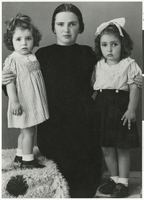
Early Molasky family photographs, image 18
Description
Susan Borukh (Molasky) at about 5 years old (far right) with her sister Shirley about 3 1/2 years and their mother Tamara Borukh, in Israel, approximately 1942.

Transcript of interview with Ronald Bananto by Eric Henninger, March 15, 1981
Date
Archival Collection
Description
Text
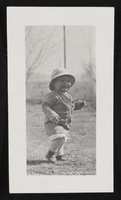
William S. Park OR John W. Park: photographic print
Date
Archival Collection
Description
Image

Andre King oral history interview: transcript
Date
Archival Collection
Description
Oral history interview with Andre "Brother Dre" King conducted by Claytee D. White on July 20, 2018 for the Remembering 1 October Oral History Project. In this interview, King recalls learning judo and wrestling at an early age. After spending ten years in prison for a burglary offense, he served an additional eleven years in facilities across the state. After twenty-one years in the system, King is now a nondenominational spiritual being and once he learned about the Healing Garden for 1 October victims, he went there daily, during and immediately after the construction. King has helped many survivors and has healed himself as well, through giving love, hugs, and spiritual inspiration.
Text
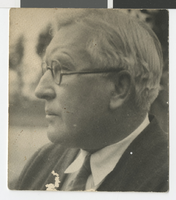
Ernest Mitchell Pratt, age 60: photograph
Date
Archival Collection
Description
Image

Mike Montano interview, September 19, 2008: transcript
Date
Archival Collection
Description
First played in Las Vegas with Jack E. Leonard in 1960. Only worked at two hotels during his 24-year Las Vegas career - Flamingo and riviera
Text
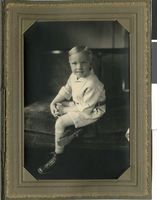
Photograph of Jimmie Wengert, circa 1928
Date
Description
Image

Juliana Urtubey oral history interview: transcript
Date
Archival Collection
Description
Oral history interview with Juliana Urtubey conducted by Nathalie Martinez and Barbara Tabach on May 24, 2021 for the Latinx Voices of Southern Nevada Oral History Project. Born in Colombia, Julia was able to immigrate with her family to the United States when she was six years old. The family lived in Chicago, Illinois and later in Phoenix, Arizona. Juliana moved to Las Vegas in 2013 and taught learners with special education needs at the elementary level. In 2021, she was named the National Teacher of the Year, the first Latina and the only Nevadan to ever hold the distinction. Juliana personally received the award from Dr. Jill Biden. Subjects discussed include: Colombia, Chicago, Illinois, National Teacher of the Year, and bilingual education.
Text
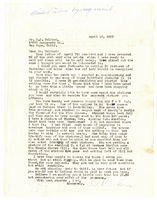
Letter from C. A. Earle Rinker to H. C. Tolford, April 16, 1957
Date
Archival Collection
Description
Text
